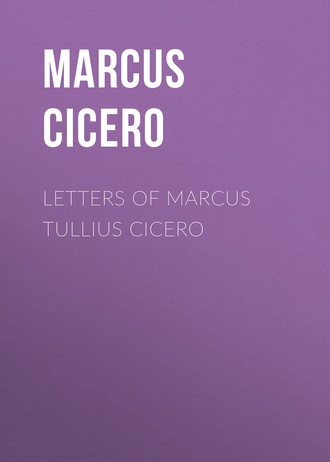 полная версия
полная версияLetters of Marcus Tullius Cicero
Just as I had written these last words—which are by my own hand—your boy came in to dine with me, as Pomponia was dining out. He gave me your letter to read, which he had received shortly before—a truly Aristophanic mixture of jest and earnest, with which I was greatly charmed. He gave me also your second letter, in which you bid him cling to my side as a mentor. How delighted he was with those letters! And so was I. Nothing could be more attractive than that boy, nothing more affectionate to me !—This, to explain its being in another handwriting, I dictated to Tiro while at dinner.
Your letter gratified Annalis very much, as shewing that you took an active interest in his concerns, and yet assisted him with exceedingly candid advice. Publius Servilius the elder, from a letter which he said he had received from Caesar, declares himself highly obliged to you for having spoken with the greatest kindness and earnestness of his devotion to Caesar. After my return to Rome from Arpinum I was told that Hippodamus had started to join you. I cannot say that I was surprised at his having acted so discourteously as to start to join you without a letter from me: I only say that, that I was annoyed. For I had long resolved, from an expression in your letter, that if I had anything I wished conveyed to you with more than usual care, I should give it to him: for, in truth, into a letter like this, which I send you in an ordinary way, I usually put nothing that, if it fell into certain hands, might be a source of annoyance. I reserve myself for Minucius and Salvius and Labeo. Labeo will either be starting late or will stay here altogether. Hippodamus did not even ask me whether he could do anything for me. T. Penarius sends me a kind letter about you: says that he is exceedingly charmed with your literary pursuits, conversation, and above all by your dinners. He was always a favourite of mine, and I see a good deal of his brother. Wherefore continue, as you have begun, to admit the young man to your intimacy.
From the fact of this letter having been in hand during many days, owing to the delay of the letter-carriers, I have jotted down in it many various things at odd times, as, for instance, the following: Titus Anicius has mentioned to me more than once that he would not hesitate to buy a suburban property for you, if he found one. In these remarks of his I find two things surprising: first, that when you write to him about buying a suburban property, you not only don't write to me to that effect, but write even in a contrary sense; and, secondly, that in writing to him you totally forget his letters which you shewed me at Tusculum, and as totally the rule of Epicharmus, "Notice how he has treated another": in fact, that you have quite forgotten, as I think, the lesson conveyed by the expression of his face, his conversation, and his spirit. But this is your concern. As to a suburban property, be sure to let me know your wishes, and at the same time take care that that fellow doesn't get you into trouble. What else have I to say? Anything? Yes, there is this: Gabinius entered the city by night on the 27th of September, and today, at two o clock, when he ought to have appeared on his trial for lese majeste, in accordance with the edict of C. Alflus, he was all but crushed to the earth by a great and unanimous demonstration of the popular hatred. Nothing could exceed his humiliating position. However, Piso comes next to him. So I think of introducing a marvellous episode into my second book—Apollo declaring in the council of the gods what sort of return that of the two commanders was to be, one of whom had lost, and the other sold his army. From Britain I have a letter of Qesar's dated the 1st of September, which reached me on the 27th, satisfactory enough as far as the British expedition is concerned, in which, to prevent my wondering at not getting one from you, he tells me that you were not with him when he reached the coast. To that letter I made no reply, not even a formal congratulation, on account of his mourning. Many, many wishes, dear brother, for your health.
XV
To P. LENTTJLUS SPINTHER (IN CILICIA)ROME (OCTOBER)M. CICERO desires his warmest regards to P. Lentulus, imperator. Your letter was very gratifying to me, from which I gathered that you fully appreciated my devotion to you: for why use the word kindness, when even the word "devotion" itself, with all its solemn and holy associations, seems too weak to express my obligations to you? As for your saying that my services to you are gratefully accepted, it is you who in your overflowing affection make things, which cannot be omitted without criminal negligence, appear deserving of even gratitude. However, my feelings towards you would have been much more fully known and conspicuous, if, during all this time that we have been separated, we had been together, and together at Rome. For precisely in what you declare your intention of doing—what no one is more capable of doing, and what I confidently look forward to from you—that is to say, in speaking in the senate, and in every department of public life and political activity, we should together have been in a very strong position (what my feelings and position are in regard to politics I will explain shortly, and will answer the questions you ask), and at any rate I should have found in you a supporter, at once most warmly attached and endowed with supreme wisdom, while in me you would have found an adviser, perhaps not the most unskilful in the world, and at least both faithful and devoted to your interests. However, for your own sake, of course, I rejoice, as I am bound to do, that you have been greeted with the title of imperator, and are holding your province and victorious army after a successful campaign. But certainly, if you had been here, you would have enjoyed to a fuller extent and more directly the benefit of the services 1which I am bound to render you. Moreover, in taking vengeance on those whom you know in some cases to be your enemies, because you championed the cause of my recall, in others to be jealous of the splendid position and renown which that measure brought you, I should have done you yeoman's service as your associate. However, that perpetual enemy of his own friends, who, in spite of having been honoured with the highest compliments on your part, has selected you of all people for the object of his impotent and enfeebled violence, has saved me the trouble by punishing himself. For he has made attempts, the disclosure of which has left him without a shred, not only of political position, but every of freedom of action. And though I should have preferred that you should have gained your experience in my case alone, rather than in your own also, yet in the midst of my regret I am glad that you have learnt what the fidelity of mankind is worth, at no great cost to yourself, which I learnt at the price of excessive pain. And I think that I have now an opportunity presented me, while answering the questions you have addressed to me, of also explaining my entire position and view. You say in your letter that you have been informed that I have become reconciled to Cmesar and Appius, and you add that you have no fault to find with that. But you express a wish to know what induced me to defend and compliment Vatinius. In order to make my explanation plainer I must go a little farther back in the statement of my policy and its grounds.
Well, Lentulus! At first—after the success of your efforts for my recall—I looked upon myself as having been restored not alone to my friends, but to the Republic also; and seeing that I owed you an affection almost surpassing belief, and every kind of service, however great and rare, that could be bestowed on your person, I thought that to the Republic, which had much assisted you in restoring me, I at least was bound to entertain the feeling which I had in old times shewed merely from the duty incumbent on all citizens alike, and not as an obligation incurred by some special kindness to myself. That these were my sentiments I declared to the senate when you were consul, and you had yourself a full view of them in our conversations and discussions. Yet from the very first my feelings were hurt by many circumstances, when, on your mooting the question of the full restoration of my position, I detected the covert hatred of some and the equivocal attachment of others. For you received no support from either in regard to my vexatious to me: but much more so was the fact that they used, before my very eyes, so to embrace, fondle, make much of, and kiss my enemy mine do I say? rather the enemy of the laws, of the law courts, of peace, of his country, of all loyal men ! that they did not indeed rouse my bile, for I have utterly lost all that, but imagined they did. In these circumstances, having, as far as is possible for human prudeuce, thoroughly examined my whole position, and having balanced the items of the account, I arrived at a final result of all my reflexions, which, as well as I can, I will now briefly put before you.
If I had seen the Republic in the hands of bad or profligate citizens, as we know happened during the supremacy of Cinna, and on some other occasions, I should not under the pressure, I don t say of rewards, which are the last things to influence me, but even of danger, by which, after all, the bravest men are moved, have attached myself to their party, not even if their services to me had been of the very highest kind. As it is, seeing that the leading statesman in the Republic was Pompey, a man who had gained this power and renown by the most eminent services to the state and the most glorious achievements, and one of whose postion I had been a supporter from my youth up, and in my praetorship and consulship an active promoter also, and seeing that this same statesman had assisted me, in his own person by the weight of his influence and the expression of his opinion, and, in conjunction with you, by his counsels and zeal, and that he regarded my enemy as his own supreme enemy in the state I did not think that I need fear the reproach of inconsistency, if in some of my senatorial votes I somewhat changed my standpoint, and contributed my zeal to the promotion of the dignity of a most distiii guished man, and one to whom I am under the highest obligations. In this sentiment I had necessarily to include Caesar, as you see, for their policy and position were inseparably united. Here I was greatly influenced by two things the old friendship which you know that I and my brother Quintus have had with Caesar, and his own kindness and liberality, of which we have recently had clear and mistakable evidence both by his letters and his personal attentions. I was also strongly affected by the Republic itself, which appeared to me to demand, especially considering Caesar's brilliant successes, that there should be no quarrel maintained with these men, and indeed to forbid it in the strongest manner possible. Moreover, while entertaining these feelings, I was above all shaken by the pledge which Pompey had given for me to Caesar, and my brother to Pompey. Besides, I was forced to take into consideration the state maxim so divinely expressed by our master Plato—" Such as are the chief men in a republic, such are ever wont to be the other citizens." I called to mind that in my consulship, from the very 1st of January, such a foundation was laid of encouragement for the senate, that no one ought to have been surprised that on the 5th of December there was so much spirit and such commanding influence in that house. I also remember that when I became a private citizen up to the consulship of Caesar and Bibulus, when the opinions expressed by me had great weight in the senate, the feeling among all the loyalists was invariable. Afterwards, while you were holding the province of hither Spain with imperiuni and the Republic had no genuine consuls, but mere hucksters of provinces, mere slaves and agents of sedition, an accident threw my head as an apple of discord into the midst of contending factions and civil broils. And in that hour of danger, though a unanimity was displayed on the part of the senate that was surprising, on the part of all Italy surpassing belief, and of all the loyalists unparalleled, in standing forth in my defence, I will not say what happened—for the blame attaches to many, and is of various shades of turpitude—I will only say briefly that it was not the rank and file, but the leaders, that played me false. And in this matter, though some blame does attach to those who failed to defend me, no less attaches to those who abandoned me: and if those who were frightened deserve reproach, if there are such, still more are those to be blamed who pretended to be frightened. At any rate, my policy is justly to be praised for refusing to allow my fellow citizens (preserved by me and ardently desiring to preserve me) to be exposed while bereft of leaders to armed slaves, and for preferring that it should be made manifest how much force there might be in the unanimity of the loyalists, if they had been permitted to champion my cause before I had fallen, when after that fall they had proved strong enough to raise me up again. And the real feelings of these men you not only had the penetration to see, when bringing forward my case, but the power to encourage and keep alive. In promoting which measure—I will not merely not deny, but shall always remember also and gladly proclaim it—you found certain men of the highest rank more courageous in securing my restoration than they had been in preserving me from my fall: and, if they had chosen to maintain that frame of mind, they would have recovered their own commanding position along with my salvation. For when the spirit of the loyalists had been renewed by your consulship, and they had been roused from their dismay by the extreme firmness and rectitude of your official conduct; when, above all, Pompey's support had been secured; and when Caesar, too, with all the prestige of his brilliant achievements, after being honoured with unique and unprecedented marks of distinction and compliments by the senate, was now supporting the dignity of the house, there could have been no opportunity for a disloyal citizen of outraging the Republic.
But now notice, I beg, what actually ensued. First of all, that intruder upon the women's rites, who had shewn no more respect for the Bona Dea than for his three sisters, secured immunity by the votes of those men who, when a tribune wished by a legal action to exact penalties from a seditious citizen by the agency of the loyalists, deprived the Republic of what would have been hereafter a most splendid precedent for the punishment of sedition. And these same persons, in the case of the monument, which was not mine, indeed—for it was not erected from the proceeds of spoils won by me, and I had nothing to do with it beyond giving out the contract for its construction—well, they allowed this monument of the senate's to have branded upon it the name of a public enemy, and an inscription written in blood. That those men wished my safety rouses my liveliest gratitude, but I could have wished that they had not chosen to take my bare safety into consideration, like doctors, but, like trainers, my strength and complexion also! As it is, just as Apelles perfected the head and bust of his Venus with the most elaborate art, but left the rest of her body in the rough, so certain persons only took pains with my head, and left the rest of my body unfinished and unworked. Yet in this matter I have falsified the expectation, not only of the jealous, but also of the downright hostile, who formerly conceived a wrong opinion from the case of Quintus Metellus, son of Lucius—the most energetic and gallant man in the world, and in my opinion of surpassing courage and firmness—who, people say, was much cast down and dispirited after his return from exile. Now, in the first place, we are asked to believe that a man who accepted exile with entire willingness and remarkable cheerfulness, and never took any pains at all to get recalled, was crushed in spirit about an affair in which he had shewn more firmness and constancy than anyone else, even than the preeminent M. Scaurus himself! But, again, the account they had received, or rather the conjectures they were indulging in about him, they now transferred to me, imagining that I should be more than usually broken in spirit: whereas, in fact, the Republic was inspiring me with even greater courage than I had ever had before, by making it plain that I was the one citizen it could not do without; and by the fact that while a bill proposed by only one tribune had recalled Metellus, the whole state had joined as one man in recalling me—the senate leading the way, the whole of Italy following after, eight of the tribunes publishing the bill, a consul putting the question at the centuriate assembly, all orders and individuals pressing it on, in fact, with all the forces at its command. Nor is it the case that I afterwards made any pretension, or am making any at this day, which can justly offend anyone, even the most malevolent: my only effort is that I may not fail either my friends or those more remotely connected with me in either active service, or counsel, or personal exertion. This course of life perhaps offends those who fix their eyes on the glitter and show of my professional position, but are unable to appreciate its anxieties and laboriousness.
Again, they make no concealment of their dissatisfaction on the ground that in the speeches which I make in the senate in praise of Caesar I am departing from my old policy. But while giving explanations on the points which I put before you a short time ago, I will not keep till the last the following, which I have already touched upon. You will not find, my dear Lentulus, the sentiments of the loyalists the same as you left them—strengthened by my consulship, suffering relapse at intervals afterwards, crushed down before your consulship, revived by you: they have now been abandoned by those whose duty it was to have maintained them: and this fact they, who in the old state of things as it existed in our day used to be called Optiinates, not only declare by look and expression of countenance, by which a false pretence is easiest supported, but have proved again and again by their actual sympathies and votes. Accordingly, the entire view and aim of wise citizens, such as I wish both to be and to be reckoned, must needs have undergone a change. For that is the maxim of that same great Plato, whom I emphatically regard as my master: "Maintain a political controversy only so far as you can convince your fellow citizens of its justice: never offer violence to parent or fatherland." He, it is true, alleges this as his motive for having abstained from politics, because, having found the Athenian people all but in its dotage, and seeing that it could not be ruled by persuasion, or by anything short of compulsion, while he doubted the possibility of persuasion, he looked upon compulsion as criminal. My position was different in this: as the people was not in its dotage, nor the question of engaging in politics still an open one for me, I was bound hand and foot. Yet I rejoiced that I was permitted in one and the same cause to support a policy at once advantageous to myself and acceptable to every loyalist. An additional motive was Caesar's memorable and almost superhuman kindness to myself and my brother, who thus would have deserved my support whatever he undertook; while as it is, considering his great success and his brilliant victories, he would seem, even if he had not behaved to me as he has, to claim a panegyric from me. For I would have you believe that, putting you aside, who were the authors of my recall, there is no one by whose good offices I would not only confess, but would even rejoice, to have been so much bound.
Having explained this matter to you, the questions you ask about Vatinius and Crassus are easy to answer. For, since you remark about Appius, as about Caesar, "that you have no fault to find," I can only say that I am glad you approve my policy. But as to Vatinius, in the first place there had been in the interval a reconciliation effected through Pompey, immediately after his election to the praetorship, though I had, it is true, impugned his candidature in some very strong speeches in the senate, and yet not so much for the sake of attacking him as of defending and complimenting Cato. Again, later on, there followed a very pressing request from Caesar that I should undertake his defence. But my reason for testifying to his character I beg you will not ask, either in the case of this defendant or of others, lest I retaliate by asking you the same question when you come home: though I can do so even before you return: for remember for whom you sent a certificate of character from the ends of the earth. However, don't be afraid, for those same persons are praised by myself, and will continue to be so. Yet, after all, there was also the motive spurring me on to undertake his defence, of which, during the trial, when I appeared for him, I remarked that I was doing just what the parasite in the Eunuchus advised the captain to do:
"As oft as she names Phxdria, you retortWith Pamphila. If ever she suggest,'Do let us have in Phudria to our revel:'Quoth you, 'And let us call on PamphilaTo sing a song.' If she shall praise his looks,Do you praise hers to match them: and, in fine,Give tit for tat, that you may sting her soul."So I asked the jurors, since certain men of high rank, who, had also done me very great favours, were much enamoured of my enemy, and often under my very eyes in the senate now took him aside in grave consultation, now embraced him familiarly and cheerfully—since these men had their Publius, to grant me another Publius, in whose person I might repay a slight attack by a moderate retort. And, indeed, I am often as good as my word, with the applause of gods and men. So much for Vatinius. Now about Crassus. I thought I had done much to secure his gratitude in having, for the sake of the general harmony, wiped out by a kind of voluntary act of oblivion all his very serious injuries, when he suddenly undertook the defence of Gabinius, whom only a few days before he had attacked with the greatest bitterness. Nevertheless, I should have borne that, if he had done so without casting any offensive reflexions on me. But on his attacking tile, though I was only arg-tling and not inveighing against him, I fired up not only, I think, with the passion of the moment—for that perhaps would not have been so hot—but the smothered wrath at his many wrongs to me, of which I thought I had wholly got rid, having, unconsciously to myself, lingered in my soul, it suddenly shewed itself in full force, And it was at this precise time that certain persons (the same whom I frequently indicate by a sign or hint), while declaring that they had much enjoyed my outspoken style, and had never before fully realized that I was restored to the Republic in all my old character, and when my conduct of that controversy had gained me much credit outside the house also, began saying that they were glad both that he was now my enemy, and that those who were involved with him would never be my friends. So when their ill-natured remarks were reported to me by men of most respectable character, and when Pompey pressed me as he had never done before to be reconciled to Crassus, and Caesar wrote to say that he was exceedingly grieved at that quarrel, I took into consideration not only my circumstances, but my natural inclination: and Crassus, that our reconciliation might, as it were, be attested to the Roman people, started for his province, it might almost be said, from my hearth. For he himself named a day and dined with me in the suburban villa of my son-in-law Crassipes. On this account, as you say that you have been told, I supported his cause in the senate, which I had undertaken on Pompey's strong recommendation, as I was bound in honour to do.
I have now told you with what motives I have supported each measure and cause, and what my position is in politics as far as I take any part in them: and I would wish you to make sure of this—that I should have entertamed the same sentiments, if I had been still perfectly uncommitted and free to choose. For I should not have thought it right to fight against such overwhelming power, nor to destroy the supremacy of the most distinguished citizens, even if it had been possible; nor, again, should I have thought myself bound to abide by the same view, when circumstances were changed and the feelings of the loyalists altered, but rather to bow to circumstances. For the persistence in the same view has never been regarded as a merit in men eminent for their guidance of the helm of state; but as in steering a ship one secret of the art is to run before the storm, even if you cannot make the harbour; yet, when you can do so by tacking about, it is folly to keep to the course you have begun rather than by changing it to arrive all the same at the destination you desire: so while we all ought in the administration of the state to keep always in view the object I have very frequently mentioned, peace combined with dignity, we are not bound always to use the same language, but to fix our eyes on the same object. Wherefore, as I laid down a little while ago, if I had had as free a hand as possible in everything, I should yet have been no other than I now am in politics. When, moreover, I am at once induced to adopt these sentiments by the kindness of certain persons, and driven to do so by the injuries of others, I am quite content to think and speak about public affairs as I conceive best conduces to the interests both of myself and of the Republic. Moreover, I make this declaration the more openly and frequently, both because my brother Quintus is Caesar's legate, and because no word of mine, however trivial, to say nothing of any act, in support of Caesar has ever transpired, which lie has not received with such marked gratitude, as to make me look upon myself as closely bound to him. Accordingly, I have the advantage of his popularity, which you know to be very great, and his material resources, which you know to be immense, as though they were my own. Nor do I think that I could in any other way have frustrated the plots of unprincipled persons against me, unless I had now combined with those protections, which I have always possessed, the goodwill also of the men in power. I should, to the best of my belief, have followed this same line of policy even if I had had you here. For I well know the reasonableness and soberness of your judgment: I know your mind, while warmly attached to me, to be without a tinge of malevolence to others, but on the contrary as open and candid as it is great and lofty. I have seen certain persons conduct themselves towards you as you might have seen the same persons conduct themselves towards me. The same things that have annoyed me would certainly have annoyed you. But whenever I shall have the enjoyment of your presence, you will be the wise critic of all my plans: you who took thought for my safety will also do so for my dignity. Me, indeed, you will have as the partner and associate in all your actions, sentiments, wishes—in fact, in everything; nor shall I ever in all my life have any purpose so steadfastly before me, as that you should rejoice more and more warmly every day that you did me such eminent service.









